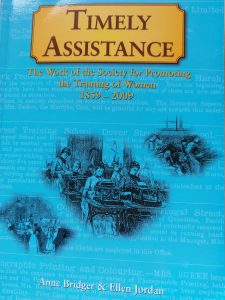As women today we have the freedom to gain an education, work and manage our finances. Visionary Victorian women dreamed this dream and then made it happen. Elizabeth and others created the future we live today.
SPEW – how it started (1859)
Society for Promoting the Employment of Women (SPEW) was one of the important steps in opening up employment opportunities. Elizabeth had initially placed her emphasis upon education for girls and women. She then worked alongside others who put efforts into ensuring that a girls’ education could open up ways for them to move into employment.
The founder of SPEW, Jessie Boucherett, identified a simple problem. Where girls were fortunate enough to gain an education there were only three professions they could enter – teaching, domestic service and needlework. Of course, these became overcrowded and so women were left with no options: working in mills or the workhouse was the road lower class women had to take. Jessie and her colleagues had a simple and yet life-changing solution – open up more employment opportunities to women.
Initially they provided training and acted as an employment agency. They trained girls for trades such as printing, hairdressing and bookkeeping but by 1865 it was clear that many skilled occupations were entered by apprenticeships. They changed direction and offered loans for girls to take up an apprenticeship; an approach that continues today.

Women at work. Thanks to Futures for Women website
Thanks to the Society, women were accepted into new types of roles: they supported the first woman to be a hospital dispenser and those starting to enter such professions as medicine. All this helped to challenge prejudices against women in employment. For example, in 1871 the Manchester Public Free Library began to employ young women as librarians. Gradually they were able to tackle entry to the professions: in the 1860s Mary Smith was a SPEW pupil in the bookkeeping classes, in the 1920s she was the first woman to be admitted to Fellowship of the Institute of Chartered Accountants.
What’s in a name?
It seems to me those visionary Victorian women were great at taking action and changing the world. They were not too hot at coming up with snappy titles. SPEW? Well, it says what it does. It was changed in the 1920s to the Society for Promoting the Training of Women. Today it has the much more appealing title of Futures for Women.
The charity today may go by a snappier title but, quite rightly, they are still proud of their history and of Jessie Boucherett. Their website offers details of their history and a link to a history of Market Rasen, where Jessie and her sister were born.
https://www.marketrasenheritagetour.co.uk/stories/boucherett

Timely Assistance. Book by Anne Bridger and Ellen Jordan tracing the history of SPEW 1859-2009. Available from Futures for Women.
Futures for Women today
Today the work of this charity is having a positive impact for many women as it is enabling them to pursue their education as an entry to a range of important and varied roles, in medicine, science, media, the arts and much more. For stories of those who have benefitted look at https://futuresforwomen.org.uk/beneficiaries/
All this support requires funding. Thus profits from sales of my book and funds raised at talks will partly go to this charity in recognition of how Elizabeth helped to ensure that girls and women gained an education and had a range of opportunities for employment.

Female scientists at work
Help me to raise funds
You can help me to raise funds for Futures for Women and the Moravian Women’s Association by:
- buying my book: once it is published I will share all the relevant details;
- booking a talk about Elizabeth. I am open to travelling and can adapt to various groups so please share this with anyone you know who books talks for network events, businesses and social groups,.
As always, you are invited to leave comments and to contact me at mary@woodhall28.co.uk
You can find me on social media: Twitter @MaryHolmes4 Facebook mary.holmes28


Recent Comments